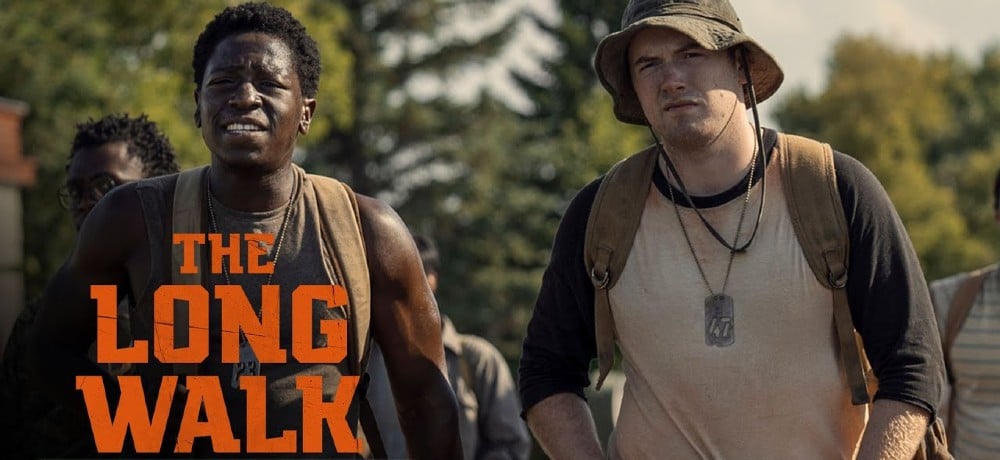






Stephen King's The Long Walk has been marching toward a cinematic adaptation for decades, with directors attached like George A. Romero, Frank Darabont, and André Øvredal. The material, as readers can attest, presents a challenge—touted as one of King's "unadaptable" properties. How do you make an endlessly bleak, not-all-that dystopian thriller about a marathon hike littered with brutal child deaths appealing to audiences? Writer JT Mollner (Strange Darling) and director Francis Lawrence (The Hunger Games franchise) answer that question with aplomb: a cruel yet spirited concoction of bittersweet camaraderie and anti-totalitarian sentiments. The Long Walk is finally hitting theaters, and it's damn well worth the wait: one of the greatest King adaptations... ever.
"The task is simple: walk or die." The Long Walk takes place in a destitute America tainted by fascism, where every year, a small handful of "lucky" of-age boys trudge forward on paved roads until there's only one left standing. Fifty entrants like Raymond Garraty (Cooper Hoffman), Peter McVries (David Jonsson), and Gary Barkovitch (Charlie Plummer) know they'll probably die, yet accept their fates because the "winner" gets one granted wish. In charge is the "Major" (Mark Hamill), a gruff and callous drill-sergeant-like officer who barks patriotic bullshit and speaks about honor while his soldiers execute any "losers" after three warnings. It's a grueling gauntlet through American ghost towns evacuated by poverty, but seen as the only way out of hardship for most American families.
The socio-political relevance of The Long Walk is impossible to ignore, and stings like the dickens. Early in the film, during one of Hamill's immaculately R. Lee Ermey-like monologues, the Major recites lines about the walk bringing back this idea of a "productive" America that have been recited verbatim by Trump's current regime. Art is no longer fantasy or exaggeration—Mollner's screenplay was finished well before these public statements. While terrifying, King's hard-to-stomach themes have only gained relevance since he wrote The Long Walk (as Richard Bachman) about the Vietnam War. Lawrence and Mollner use today's American political climate as added tension, exposing the cyclical failures of a government run by self-interest and capitalist greed.
For the "politics don't belong in horror" crowd, hold on to your butts. The Long Walk is a phenomenal examination of desperation and systemic failures. It's a provocative amplification of the means it takes to fight oppression and what valuable protest looks like that is, so disappointingly yet inspiringly, intended for a moment.
None of that would be possible without a knockout ensemble that impressively stays in step throughout the entire journey. It's easy to single out Cooper Hoffman, who disappears into a complicated role fueled by anger and shortsighted consequences, but there isn't a single slouch amongst the "boys." Ben Wang tugs at our empathy as the gum-chewing Hank Olson, Tut Nyuot will bring you to tears as Arthur Baker, and Joshua Odjick makes the most of his empowering arc as the event winds down. Garrett Wareing, Roman Griffin Davis, and Jordan Gonzalez all shine in their devastating spotlights. There's storytelling depth left on the table considering Charlie Plummer's Gary Barkovitch, a well-acted part that feels surface-level given its implied connection to mental health issues, but that's the weakest element. Everything else is solid as granite. If there were justice, The Long Walk would be mentioned during awards season for full-cast awards.
Although, should there be a Most Valuable Player, it's David Jonsson as Peter McVries. If his Alien: Romulus android "Andy" was his coming-out party, The Long Walk is his star-making performance. Jonsson's fixture as this beacon of sunshine that keeps his buddies motivated instills a much-needed feeling of hope throughout the otherwise merciless charade. It's this hope that allows The Long Walk to unleash despicable violence while giving viewers something to root for and a reason to keep watching. The chemistry between Jonsson and Hoffman bleeds into conversations between other walkers, almost as if they're taking the weight off everyone's shoulders. Whether it's jovially tossing a baseball or exposing fallacies in each other's mindsets about what the walk represents and how to use their bulletproof wishes, the rawness of their words grabs you by the collar. Mollner's screenplay lays the groundwork, but what Jonsson, Hoffman, and the rest do with these words is far more than idle banter.
The Long Walk is more than just "walk, talk, death, repeat." Yes, that's the outline, but so much heartache and technique fill every gap. There's this propulsive momentum that keeps shots engaging as participants stay above three miles per hour, despite rural backgrounds mainly remaining uncrowded. There's a rotten Americana stench that makes the film's military state horrors hit like a Mack truck, and yet the experience is wholesomely robust. Laughter is not uncommon, nor are the chummy highs as friendships blossom from poisonous soil. So are sobering tears that stream as another dog tag is claimed by the Major's flanking escourts. Lawrence is in total command of a project that's brimming with all sorts of emotions, and he lets every gasp or smile breathe, to be felt at their fullest. It's a nimble, nose-to-tail nightmare that doesn't waste any character, message, or climax—a nearly impossible task.
Simplicity can be deceptive. The Long Walk is, on paper, about so little — yet the film is jam-packed with meaning. King's literature comes to life through passionate performances and precision filmmaking, meeting and exceeding the challenges presented by the author's very first written story. It's a soul-shredding watch in the best way: a chilling depiction of failed generations, American follies, and the strength it takes even to start conversations about purposeful change. The "unadaptable" becomes one of the year's most harrowing and impactful watches, defying preconceptions to emerge ahead of this year's horror pack.
Movie Score: 4.5/5